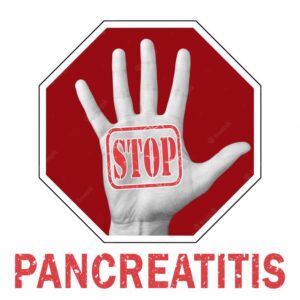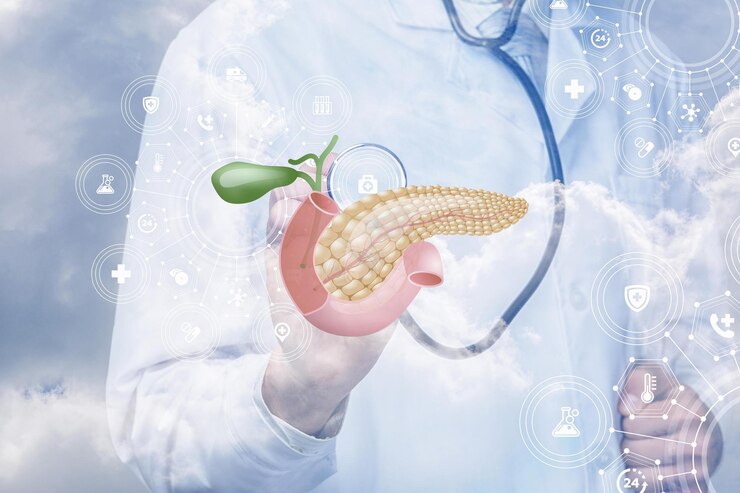Pancreas is a gland situated in the upper zone of the abdomen that produces enzymes that help digestion and control your body’s sugar levels. Inflammation of the pancreas is called pancreatitis which can occur as acute or chronic.
Acute pancreatitis has an abrupt onset and the enzymes produced in the gland are activated causing auto-digestion of the pancreatic gland. Repeated attacks of acute pancreatitis can lead to chronic pancreatitis in which the gland is progressively destroyed over a while. Pancreatitis is most common in ages between 40- 60 years and it is equally common among men and women.
Etiology of Pancreatitis

Most of the time the cause is not identified for acute pancreatitis. But it can be caused by,
- Gallstones obstructing the duct of the pancreas
- Carcinoma of the pancreas
- Excessive usage of alcohol
- Infections including viral
- Trauma to abdomen
- High lipid levels in the body including triglycerides
- Obesity
- Certain medications as NSAIDs
- A family history of a blood relation having pancreatitis can be a risk factor.
Clinical Manifestations
Signs and symptoms that occur in acute pancreatitis are given below.
- Sudden pain first appears in the area of the abdomen called the epigastrium and reaches the maximum intensity of pain within a few hours. Pain radiates through to the back.
- Abdominal pain is increased even by the slightest movements as respiration.
- Pain is associated with fever profuse sweating
- Tenderness when touching the abdomen
- Fever
- Frequent vomiting and retching
- Persistent nausea between bouts of vomiting
- Increased pulse rate
- Muscle twitching and cramps
- Signs and symptoms that occur in chronic pancreatitis are given below.
- Recurrent, severe episodes of upper abdominal pain which radiates towards the back. Pain can be defined as dull, constant, and gnawing pain.
- Pain is increased with the consumption of alcohol
- Oily smelly stools
- Loss of weight
- Nausea
- Drug addiction as they take drugs to relieve continuous episodes of pain
Complications of Pancreatitis
- Pseudocysts can be formed in the pancreas which can rupture lately and cause internal bleeding and infections.
- Pancreatic infections can occur
- Malnutrition due to a lack of enzymes essential for food digestion
- Diabetes
- Pancreatic cancer
- Kidney failure
- Respiratory issues
Diagnosis of Pancreatitis
- Tenderness of the abdomen, low blood pressure, low fever, and increased pulse rate can help the doctor to diagnose pancreatitis. Acute pancreatitis is mainly diagnosed by assessing the levels of blood amylase and lipase enzymes.
- X-ray or imaging tests such as CT scan or MRI can diagnose calcifications of the pancreas caused due to chronic pancreatitis.
Management of Pancreatitis
Pharmacological Management
Acute Pancreatitis
- Painkillers treat severe pain the patient is suffering from.
- A nasogastric tube will be inserted for feeding. As eating must be stopped for a while to let the pancreas recover.
- Intravenous antibiotics will be given if the pancreas is infected.
- Endoscopic retrograde cholangiopancreatography (ERCP) is a surgical procedure in which insertion of a tube down your throat into the stomach and upper intestines to take out the gallstones if they’re blocking your bile or pancreatic ducts.
Chronic Pancreatitis

- Drugs to reduce pain
- Medications for diabetes mellitus
- Pancreatic enzymes help the body get nutrition
Non-pharmacological Interventions
- Stop smoking
- Reduce or stop alcohol intake
- Get advice from a dietician regarding your diet and act accordingly when you are eating.
References
- Bailey and Love’s Short Practice of Surgery- 27th Edition
- Kumar and Clerk’s Clinical Medicine -8th Edition- Parveen Kumar, Michael Clark
- Oxford Handbook of Clinical Medicine – 10th Edition
- Browse’s Introduction to the Symptoms and Signs of Surgical Disease – 4th Edition – Norman L. Browse, John Black, Kevin G. Burnand and William E.G. Thomas

